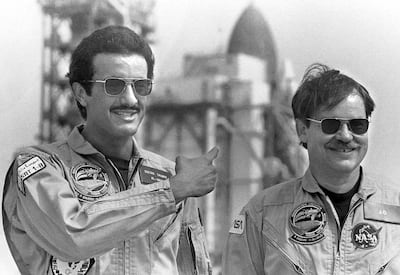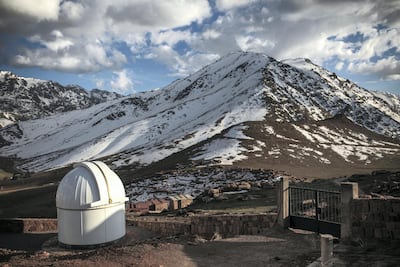After the UAE launched the Arab world’s first successful mission to Mars on Tuesday, discussion around other regional space programmes has been re-energised.
People across the region tuned in to watch the Emirates Mars Mission online.
The probe, called Hope (Amal in Arabic), is now in orbit around the Red Planet – a feat only achieved by four others, including the US, the former Soviet Union, the European Space Agency and India.
The ambition has been brewing since 2014, when the UAE announced it would send a mission to Mars. "We chose the epic challenge of reaching Mars because epic challenges inspire us and motivate us. The moment we stop taking on such challenges is the moment we stop moving forward," Sheikh Mohammed bin Rashid, Vice President and Ruler of Dubai, said at the time.
Six years on, the Hope probe has been successfully sent into orbit around Mars, with the first images due to be beamed back in a week followed by the scientific data it has been sent to capture within the next two months.
Overcoming a 50 per cent chance of failure as it entered the Mars orbit, Hope has inspired memories of other space ventures in the region.
Here is a breakdown of other prominent space initiatives and programmes in the Middle East:
Saudi Arabia
In 1985, Saudi Prince Sultan bin Salman Al Saud became the first Arab to fly in space after being chosen by Nasa to fly on the space shuttle Discovery as part of a seven-member international crew.
During the seven-day mission, Prince Sultan represented the Arab Satellite Communications Organisation (Arabsat) and took part in the deployment of the organisation’s satellite, ARABSAT-1B.
While in space, he also carried out a series of experiments that had been designed by Saudi scientists, including an experiment concerning the behaviour of oil and water when mixed in zero gravity.
Last year, the kingdom announced it was planning to allocate a $2.1 billion boost for its space programme by 2030 under an economic diversification plan.
In 2018, it established the Saudi Space Commission (SSC) to stimulate space-related research and become a global player in the space industry.
Saudi Arabia is a main founder and financier of the Arabsat, launched in 1976 to deliver satellite-based telecommunications services across the Arab world.
Morocco
Moroccan scientific production in astronomy and astrophysics has shown sustained growth since the late 1980s.
It is mainly thanks to the Oukaimeden Observatory, a joint Swiss-French-Moroccan project,located 50km south of Marrakech in the High Atlas mountains at an altitude of 2,750 metres.
Over the past decade, the project’s giant telescope has become one of the most prolific telescopes in the world in terms of discoveries of small bodies in the Solar System.
Qatar
Qatar entered the space age in 2010 when it launched the Qatar Exoplanet Survey (QES), founded by Khalid Al Subai, who returned to Qatar after gaining a doctorate in astronomy in the United Kingdom.
The goal was to explore the space for exoplanets – the small planets orbiting a star other than our sun.
The QES project uses a space-probing method known as transit to detect new exoplanets through its remotely located telescopes in New Mexico (USA), Tenerife (Spain) and Urumqi (China).
In 2013, Qatar successfully launched its first satellite, Es'hail -1.
The satellite was launched into space on board an Ariane 5 rocket from the Kourou spaceport in French Guiana.
Egypt
Egypt's early interest in interstellar exploration dates to 1960 when it officially started its space programme.
Over the past three decades, Egypt has set a record in Africa, launching a total of nine satellites into space with the main purpose of communication and TV broadcasting.
In 2016, the government created a national space agency to keep pace with digital competition and the development of knowledge-based economies in the Middle East.
Bahrain
In 2014, Bahrain established National Space Science with a vision to promote scientific and space research.
Four years later, the kingdom announced it was setting up a “space team” with the aim of launching its first satellite into orbit.
The 3U CubeSat, which is being implemented by young scientists from Bahrain and the UAE as part of a joint space project, is expected to be launched to the International Space Station this August, and from there into space in October 2021.
Oman
The sultanate's first national satellite programme began in June 2020, led by Space Communications Technology LLC, which aims to launch it's thefirst satellite by 2024.
The project is being developed to bolster the country's telecommunications network and serve the evolving needs of Oman’s public and private sectors.
Speaking ahead of the country’s 50th National Day, the minister said Oman’s plans to go to space actually began in 2006.
Israel
Israel established its space agency in 1983 with a vision to be among the leading countries involved in space research and its exploitation.
The agency has invested since then in start-ups, development and construction of the country’s own satellites for civilian purposes.
It further cultivated a cadre of Israeli scientists through focusing on space science education and community projects.
Israel became in the 1980s the eighth country in the world to succeed in launching and positioning satellites in space.
The Israeli space scientists focus on high resolution photographic satellites that are positioned in the Low Earth Orbit (LEO) and communication satellites positioned in the Geocentric Orbit (GEO).
Lebanon
In the 1960s, a young Armenian man named Manoug Manougian and a group of seven students established the Lebanese Rocket Society out of the American University of Beirut.
Their prototype rockets had to be built from scratch using cardboard and bits of piping due to a very tight budget.
They managed to design the first rocket by April 1961, which reached an altitude of 1,000 metres. The next rocket made it to 2,000 metres.
After word of their efforts spread, the students named their project after Lebanon's Cedar, a symbol of resilience and strength.
Several regional countries were reportedly interested in buying their project, but Mr Manougian told the BBC that he rejected all bids.
He decided to halt the programme after a failed third launch narrowly missed a ship in the Mediterranean, but remains a source of pride in Lebanon, which issued stamps to commemorate the unfulfilled space dream.




















































